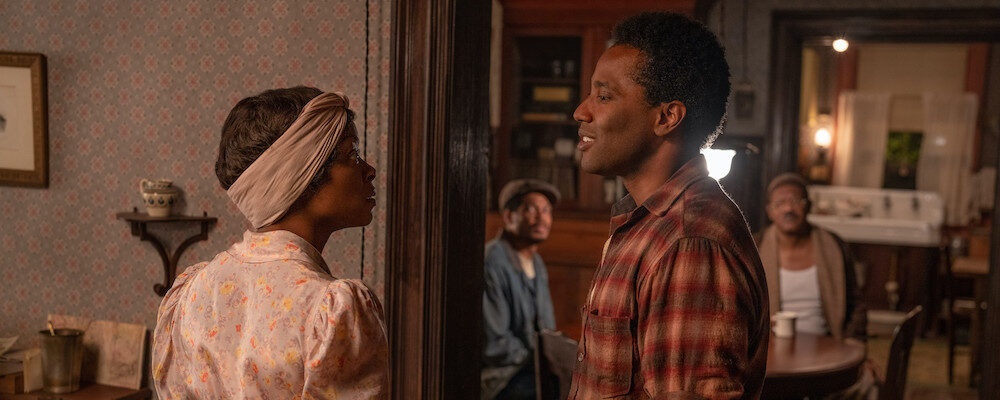‘The Piano Lesson’ Adapts August Wilson’s Rhythms To Cinematic Beats for a Classic Ensemble Performance
Tony Sokol
Prolific playwright August Wilson was one of the most ingenious storytellers. The cinematic adaptation of his Pulitzer Prize-winning “The Piano Lesson,” the fifth play in Wilson’s cycle surrounding Pittsburgh, uses horror as conflict resolution. This story is about a former sharecropper, Boy Willie Charles (John David Washington), who wants to sell his sister Berniece’s (Danielle Deadwyler) piano to buy land to farm. Ghosts are only gossip that gained traction on the 1,800-mile trip north to Pittsburgh.
Directed by Malcolm Washington, who co-wrote the screenplay with Virgil Williams, the action is pushed by the ensemble cast, most of them from the 2022 Broadway revival. This adds soul to the performances, because they have shared the stage with the spirit resting between the keys. Washington is the son of the film’s producer, Denzel Washington, who also produced the cinematic adaptations of Wilson’s “Fences” and “Ma Rainey’s Black Bottom.” Malcolm Washington’s feature debut is an overt tribute to stagecraft.
Each actor gets a chance to enjoy exquisite dialogue, even if it doesn’t come out of their mouths. So much of Lymon’s (Ray Fisher) communication flows nonverbally, words should be superfluous, but they offer too many twists to pass up. Much like the small bottle of French-smelling perfume Lymon gives Berniece in a sexually-charged but sweet evening scene. Fisher is always actively listening and leisurely watching, Lymon’s comments are consistently deep, unexpected and succinct.
Berniece and her young daughter, Maretha (Skylar Aleece Smith), live with their uncle, Doaker Charles, played by Samuel L. Jackson, who played Boy Willie in the original 1987 stage production at the Yale Repertory Theatre. Doaker spends most of his time bemused by his own amusement, especially when none of his stash of whiskey is replenished by visiting family. Doaker wasn’t born to be a peacekeeper. He aged ungracefully into the part, and would be just as happy to douse the flames of his niece and nephew’s tinderbox of a sibling connection.
After he sells a truckload of watermelons, Boy Willie plans to move back south, in full legal possession of the land his family worked for the Sutter family. Berniece wants to bury the past. Even the family piano, ornately carved with images of generations of their family by a talented slave, is a buried treasure in plain sight. Berneice never lifts the lid; never lays a finger on the ivories she tinkled daily as a child. Berniece also never lays a finger on Avery (Corey Hawkins), a lifelong admirer beginning his career as a preacher. She has turned down several of his proposals, so one more adamant plea shouldn’t make a difference. Berniece is in mourning. Her husband was killed in an ambush for stealing.
“At least if you gave lessons and made money,” Boy Willie would relent, but Doaker’s older brother, Wining Boy (Michael Potts), can shut that down before class begins. Potts gives a soliloquy on the evils pianos bring the player with equal measures of fire, brimstone and melodic melancholy. The former piano player almost blows the roof off Doaker’s house when he finally indulges in a few stanzas.
Berniece also blames her brother for the death of her husband. But that was back in the time when crime meant upward social mobility, and Boy Will was not the man who pulled the trigger. A sheriff did that, and shot Lymon in the stomach as well. The seemingly cursed piano means more to Berniece than that. Berniece also suspects Boy Willie pushed Sutter down the well, not the Yellow Dog ghost of local legend.
This film is in no way stage-bound. It begins explosively on July 4, 1911 in Mississippi. The thieves use the Independence Day fireworks as a distraction to steal the piano from the white former slave owners who bought it for the price of one and a half slaves. The introductory sequence condenses a complicated history into a burning action sequence. When the action resumes in Pittsburgh in 1936, explosions often hide personal implosions.
Though the family troubles and traumas are dramatic, each character brings their own personal comedy. Wilson also allows the troupe to turn painful anger into enraged art when Boy Willie breaks into the prison song “Berta, Berta” during drinks at the dinner table, and the stomping feet which carry the beat can be felt symbolically at every march.
Each of the players were uniformly evocative, confrontational and vulnerable, Danielle Deadwyler and Samuel L. Jackson possess an intuitive affinity for Wilson’s rhythms. Both bring the periphery into focus, and the focus on those things no one is comfortable confronting. “The Piano Lesson” is soulful, the performances are spiritual, but grounded deep in the mud that keeps messing with Lyman’s truck tires.
“The Piano Lesson” begins streaming Nov. 22 on Netflix.

